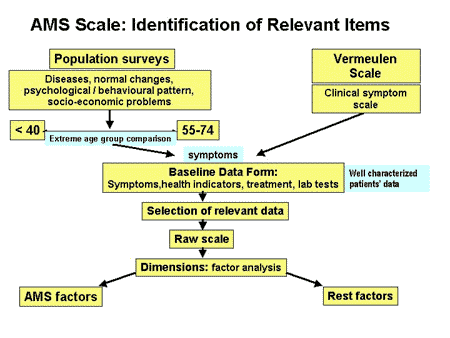Men and women develop similar complaints while aging
The AMS was developed in response to the lack of standardized scales to measure the severity of aging-symptoms in men, and their impact on quality of life. Many men experience age-related symptoms similar to those traditionally ascribed to women. Experiences include impaired memory, lack of concentration, nervousness, depression, insomnia, periodic sweating or hot flushes, bone & joint complaints and reduction of muscle mass. Despite Werner 1 reporting the similarity of male and female complaints as early as the 1940s, age-related complaints in men have only recently been seen in the context of hormonal involution. The debate about male climacteric, as well as its compatibility with the female menopause, continues. 234
Sensations of sweating occurring suddenly and unexpectedly, particularly at night (hot flushes) seem to be common in men and women. The AMS is based on the hypothesis that episodes of sweating might be an important symptom of the changes occurring during aging for both sexes. Moreover, the development of a diagnostic instrument that assesses health-related changes of quality of life (HRQoL) in men may be beneficial for discussions on potential treatment modalities.

Key objectives
- To measure health-related quality of life (QoL) or severity of complaints in aging males
- To measure changes over time and across different cultures (AMS scale available in 29 languages)
- To measure changes before/ after treatment of androgen deficiency
- To measure in a standardized way
1. Werner AA. The male climacteric: report of 273 cases. JAMA 1946; 132:188-94.
2. Bauer J. The male climacteric – a misnomer. JAMA 1944; 126: 914-18.
3. Degenhardt A. Wechseljahre beim Mann, gibt es sie? In: Fischer S, Streb-Lieder & Vogt, eds. Wechseljahre für Fortgeschrittene. Frankfurt: Verlag für akademische Schriften. 1995: 104-18.
4. McKinlay JB, Longscope CH, Gray A. The questionable phys. and epidemiologic basis for a male climac-teric syndrome: preliminary results from the Massachusetts Male Aging Study. Maturitas 1989; 11:103-5.
 updated
updated